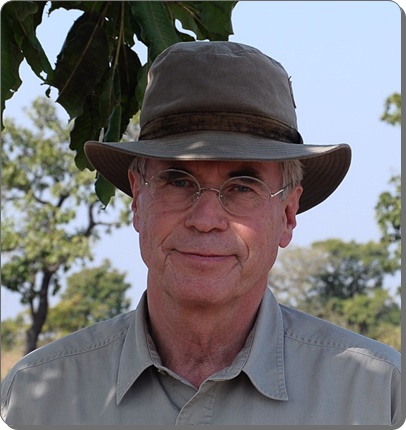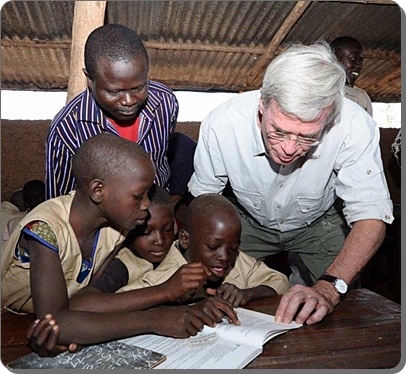Cotton Made in Africa: Improving the World of Smallholder Farmers

 |
| Dr. Michael Otto |
The goal was to provide enough assistance so cotton growers in sub-Saharan Africa could earn a decent livelihood from their hard work in the fields. We wanted to stop the suffering caused by subsidies that artificially keep the global price of cotton low, leaving small-holder farmers with no way to earn a living that would allow their families to live with dignity. Involving companies in our efforts was and continues to be what made our idea so unique. The foundation’s very name clearly expresses the approach we have followed from the beginning: helping others help themselves through trade – Aid by Trade. The foundation was not set up to offer charity to African small-holder farmers; it provided an opportunity for trade on an even playing field. As our friend and member of the Board of Trustees, James Shikwati from Kenya once said: “Stop charity and let’s start doing business with each other.” Before we had even met, his critique of traditional development aid perfectly expressed the principles of the Aid by Trade Foundation and its Cotton made in Africa Initiative. So this was our goal – aid through trade in support of small-holder farmers and to protect the environment. And where are we now – ten years down the road? A lot has happened between 2005 and 2015 – through the foundation’s work and in a global context as well, of course.
Today social inequality and the North-South wealth gap are more pronounced than ever before. Thousands of people are fleeing their home countries to escape war, poverty and displacement. They come to Europe in hopes of a better life. Their homelands offer no prospects for them or their families – only hopelessness. So for many, the only option left is to cross the ocean or move to the cities where they eke out miserable existences in the spreading slums.
 |
| Dr. Michael Otto in Benin |
As a business man, I have long felt that the private sector has to step up, assume responsibility, and explore the ethical and moral challenges of its actions. This includes the sources of products and raw materials, their traceability back to the point of origin, and the conditions under which they are made, processed and finished.
The demand for more mindfulness, greater care and sufficient responsibility all along the value chain challenges us every day. And it should, since this forces companies to reflect on how they source materials and products, and contributes to ensuring that raw materials produced under sustainable conditions are used and that the workers who produce goods for the global market enjoy social working standards and fair wages.
These days, more and more companies are committing to corporate responsibility and publicly declaring their support for sustainable business. This is a wonderful step in the right direction. But is it enough? I don’t think so. We are still working from within a system that primarily focuses on optimising financial considerations.
As members of the business community though, it is up to us to change the entire system, promote sustainability, and find alternate paths to take. This involves more than just taking responsibility for workers in their home countries and pushing for good working conditions in supplier countries: Our responsibility has to go beyond the manufacturing process alone. It has to start at the beginning of the supply chain – and include the sourcing of raw materials, such as cotton. It is essential that we bring consumers on board as well, since they exert considerable influence on the type of products made and sold. They are still not prepared to pay the real price for their products though and insist that sustainability cannot be more expensive.
Even if we have successfully recognized the greatest ecological and social challenges facing us today – the path from knowing to acting is often still a long one. So energy is still needed – ours and yours – as partners, supporters and not least as multipliers to fully deploy the power of the idea behind Cotton made in Africa, and to raise the huge potential of the initiative for improving the lives of hundreds of thousands of small-holder farmers. The path still before us is long. But with the help of its partners, the Aid by Trade Foundation has already achieved a lot: We initially started in Burkina Faso, Benin and Zambia.
Today 650,000 famers in ten countries participate. Our partnerships with GIZ, the DEG and the Bill and Melinda Gates Foundation as part of the COMPACI program have been key factors in our expansion. This partnership and close, fruitful cooperation with cotton companies has turned Cotton made in Africa into one of the most important initiatives for sustainable cotton both in Africa and worldwide. We have benefited from the support of consultants from the WWF, Welthungerhilfe and NABU over the years. They have worked with us to update and improve our standards, and ensured that Cotton made in Africa enjoys an exceptional reputation with the relevant stakeholders and can fully unfurl its social and ecological potential in Africa, such as through joint projects.
Our around 25 corporate partners, whose demand for cotton is the motor that drives Cotton made in Africa, have accompanied us on what has been a long and sometimes rocky road. From the first products that hit the market in 2007 – a men’s jacket from one of our ground-floor partners, Tom Tailor, made from Zambian cotton, featured in the OTTO catalogue and online shop, and promoted by Peter Maffay who wore it on tour – to contracts worth millions for Cotton made in Africa cotton. Some textiles are even being made in Africa today.
By awarding contracts to African manufacturers in Ethiopia or Uganda, the textile industry is showing its pioneering power to directly affect development policy. Today I want to lay the cornerstone for a new, lasting Aid by Trade Foundation institution, both as in celebration of the first 10 years of our successful activities and as encouragement for the next decade.
We have completed a number of very effective projects, such as the construction of schools and wells, and promoting women and adult literacy. These are all signs of the productive cooperation between the people involved on both ends – Africa and Europe – from small-holder farmers, cotton companies, NGOs, and the public and private sector. These projects have already provided concrete and unwavering assistance to many thousands of people in Africa, thus laying the groundwork for a better life.
To promote other similar projects in education, health care, women’s rights and nature conservation, it is my pleasure to announce a new Cotton made in Africa program. I am supporting with one million euros in initial capital.
By Dr. Michael Otto
Chairman of the Supervisory Board of the Hamburg-based retail and services group, Otto (GmbH & Co KG).
